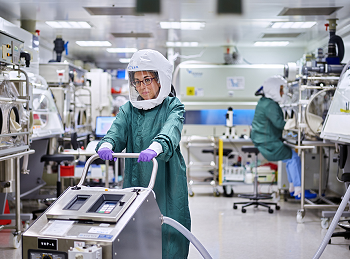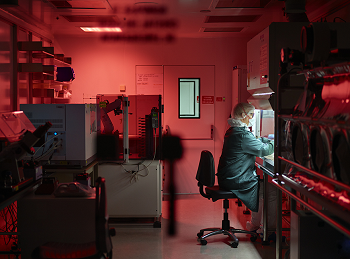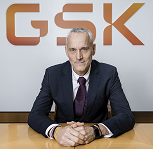The workforce at the GSK R&D centre in Madrid has tripled during its 30-year trajectory to the current 140 employees
GSK is a biopharmaceutical company focused on responsible innovation that strives to discover and develop transformative medicines and vaccines. In Spain, it conducts research into infectious diseases that affect developing countries. It anticipates diseases with a combination of science, technology and talent.
This British pharmaceutical company has a long history in Spain, with more than 40 years of industrial tradition, outstanding names and brands in the chemical and pharmaceutical industries, and based on science and innovation. Nowadays, it has more than 1,700 employees in our country, assigned to different business units, a research centre and a production plant.


The R&D centre in Tres Cantos has just turned 30 years old. How would you sum up its activity?
GSK has been conducting research in Spain at our R&D centre in Tres Cantos for 30 years. It is the only private centre in Spain devoted entirely to research into infectious diseases in developing countries. Over time, it has become a global benchmark in the search for new treatments for malaria, tuberculosis and other endemic infectious diseases that claim millions of deaths every year. It has been 30 years since GSK realised that if we want to anticipate a disease and contribute to global health, we must invest time and resources by having a research centre equipped with all the advanced technologies available to combat illnesses like malaria and tuberculosis, as well as others caused by parasites, such as Chagas disease and Leishmaniasis. It is a privilege for us that GSK decided to invest in this centre in Spain, and that it has grown continuously during these three decades in terms of capacity and resources and, crucially, in the quality of our portfolio of innovative medicines and discoveries in collaboration with the world’s top researchers. The mission is clear: to change the epidemiological course of these diseases by first anticipating them and then to be able to talk about them in the past tense. At the end of the day, what matters is that we have a positive impact on the health of the planet's most vulnerable people.
What are the centre’s most outstanding achievements?
Numerous milestones have marked three decades at the Tres Cantos R&D centre. The magazine Nature published the Tres Cantos Antimalarial Set in 2010, an important starting point for discovering new drugs with an innovative mechanism of action against malaria. Years later, in 2016, the so-called “kineto boxes” were published - compounds that inhibit the parasites that cause Leishmaniasis, Chagas disease and sleeping sickness. The centre has also published a set of efficient compounds against bacteria produced by tuberculosis. The company’s commitment to global health led to the development of the first medicine against HIV, the first preventive vaccine against malaria recommended by the WHO and FDA approval of the first new anti-relapse therapy in 60 years for Plasmodium vivax malaria. Our leadership extends to other areas such as tuberculosis, a field in which we have led one of the largest scientific consortia since 2020 to accelerate antibiotic development (ERA4TB and Unite4TB). The positive results observed in phase IIa of a new class of medicine candidate for patients with tuberculosis were a recent milestone at this centre. Tuberculosis is still the main cause of death from infectious disease worldwide and there is an urgent need for new treatments due to resistance to current options, which can be lengthy treatments and have serious adverse effects.
How has the centre evolved and how do you expect it to keep growing?
Our research centre in Spain currently has 140 employees, 64% of whom are women. The workforce has grown threefold in the last 30 years. It is now equipped with all the human resources and technology needed to move from an idea or concept to the identification of candidate molecules for entry into clinical phases. Our facilities are equipped with Level 3 biosecurity laboratories, enabling us to conduct all the necessary studies with respiratory pathogens that cause tuberculosis and Covid-19. At the recent WHO meeting in Kigali GSK announced that our company will invest more than 1.1 billion euros worldwide over the next ten years to continue research into global health, with a focus on the infectious diseases that affect the world's most disadvantaged populations. Since its beginnings, the centre has been characterised by a research model based on open innovation that facilitates information exchange, access to new technologies and collaboration between different groups and laboratories. In this regard, it is worth mentioning the work of the Tres Cantos Open Lab Foundation, implemented in 2010, which allows scientists and academics from organisations around the world to access our site and knowledge to drive their own projects.
What other infrastructure do you have in Spain?
We currently have a production centre in Aranda de Duero (Burgos) with 600 employees, and which exports more than 95% of the drugs it manufactures to 130 countries. It has been operating for more than 40 years in Spain and is mainly focused on production, packaging and the supply of products in the area of respiratory agents (aerosols and inhaled liquids) and tablets, mainly for HIV treatments.
What is Spain’s role in the company strategy?
GSK is a biopharmaceutical company with global presence. We have more than 70,000 employees in 100 countries, but our commitment to Spain is steadfast. We are the leading country in clinical research at all levels: we are among the three countries with the highest volume of clinical research within the company’s operating countries. We have invested more than 260 million euros in R&D in Spain in the last five years. This firm commitment to Spain has placed us year after year in the category of an excellent company within the Profarma Plan.
What is your customer profile?
We are currently collaborating with numerous research centres and private companies to develop new treatments for tuberculosis and malaria. These include evaluating our compounds in development against pathogens in patients in Spain, and in clinical studies that can be conducted anywhere the diseases are prevalent. It is also important to point out our collaboration with the educational world and with universities, which has led us to recruit students in biomedical sciences to work with us on products being developed at our sites. The fact that we are the headquarters of the Tres Cantos Open Lab Foundation means that we have a wider range of needs than is usual, and the support received by Spanish bodies is essential for it to fulfil its work. Our researchers are also integrated and collaborate with the Spanish scientific community, participating in different Master’s programmes for post-graduates, giving scientific talks and collaborating in educational activities such as Science Week and Researchers’ Night.
What challenges do you have ahead of you?
Our commitment in Spain to R&D into diseases in developing countries continues to grow, and we will keep working day after day to achieve at least another 30 years of contribution to research and development to combat them. Our flexibility and responsibility to continue contributing to new diseases became evident with the 2020 transformation of part of our R&D centre to help cope with the Covid-19 pandemic. And we continue to make progress, preparing and improving our facilities for a new expansion in the near future that will enable us to contribute to the fight against other pathogens.
Photos: GSK



